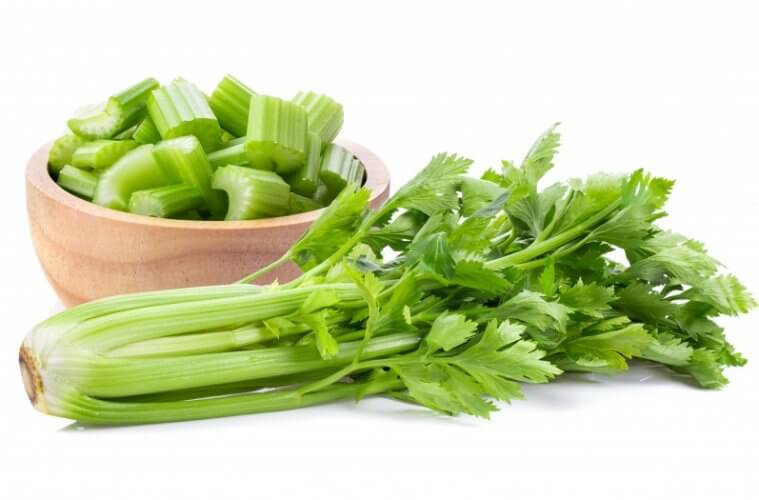Celery is also known as Apium graveolens, Wild Celery, Bari ajmod, Ajamodaa, etc.
Contents
Habitat
Celery grows all over the world. The plant, on the other hand, prefers a hotter climate. It mainly grows in southern and central Europe, the United Kingdom, and tropical climate zones1 in Asia and Africa.

Taxonomic information
Order Apiales
Family Apiaceae
Genus Apium L.
Species Apium graveolens L.
Description
This biennial plant can grow up to 1-meter tall. Celery plant leaves are bipinnate to pinnate with rhombic leaflets. The flowers are medium creamy-white colored and 2 to 3-mm in size. The seeds are globose to full ovoid and 1.5 to 2-mm in dimension.
Chemical Compounds
Celery contains petroselinic, oleic, linoleic, linolenic, and palmitic acids.
Part used
The whole plant extracts and seed extracts are used for medicinal purposes.

Traditional Uses and Benefits
Commonly, Celery is used everywhere as a vegetable. The fleshy taproot is more beneficial than leaf stalk.
Celery leaves are commonly used in cooking to hold a moderately spicy flavor. It is similar to the black pepper smell but a bit milder.
Crushed celery seed salt is very popular as a seasoning. In cocktails like Bloody Mary, it will enhance the flavor. Sometimes it’s used in foods like hotdogs too.
In traditional and alternative medicine, seed extracts are used as herbal medicines. It helps to relieve and heal different kinds of pain.
Celery is an alternative natural source of Vitamin K. It also contains various vitamins and minerals.
The Apium graveolens show cytotoxic and anti-inflammatory influences2 for various users.
Celery drugs are helpful in the treatment of cardiovascular disease. The mixture helps lowering serum lipid, blood glucose and decrease blood pressure3. If used regularly, it is possible to achieve an energetic heart.
The plant extract acts as a natural preservative.
There is insufficient evidence that celery drugs help treat arthritis, cancer and have detoxifying properties. More investigation is required.
Dosage and Precautions
Adults should take 1 to 4 gm of seed per day. Other celery drugs should cover 200–400 mg regularly. The medical practitioners recommend the doses. Age, gender, and other medical issues are taken into account when calculating the dose.

Toxicity
For a group of peoples, the plant as food can bring severe allergic reactions4. Additional adverse reactions are noted throughout clinical analyses of this plant. Certainly, anaphylaxis, phototoxicity, and dermatitis have been reported for celery drugs. These drugs also cause dose-dependent hepatotoxicity.
Warning
Consuming any drugs for more prolonged and high-dose can produce different health difficulties. Any person with bipolar disorder should consult with the doctor before using celery drugs. The Apium graveolens drugs may interact with pre and post-surgery medicines. It will show toxic effects if used for an extended period. Always consult a doctor before using celery drugs.
DISCLAIMER
The content and information on newerapost for information and educational purposes only. It is not for self-diagnosis and self-treatment. The content is not a medical manual. Before beginning the use of any prescription, medication and pursuing any self-treatment, all readers should consult a physician.
The information given in this article is intended to help you make informed decisions for your health. You must consult with your doctor before pursuing any natural remedies if you are under care for any health condition.
Do not take any vitamins, minerals, herbs, or other supplements without consulting your doctor, if you are taking any medication. The website does not make a representation, express or implied, regarding the accuracy of the information and does not accept any single responsibility for any errors or misuse.
Reference
- Tropical climate areas: Retrieved from the wikipedia.org website. https://en.wikipedia.org/wiki/Celery
- Anti-inflammatory influences: Retrieved from the flowersofindia.net website. http://www.flowersofindia.net/catalog/slides/Celery.html
- Decrease blood pressure: Retrieved from the drugs.com website. https://www.drugs.com/npp/celery.html
- Allergic reactions: Retrieved from the degruyter.com website. https://www.degruyter.com/document/doi/10.1515/jcim-2016-0141/html

